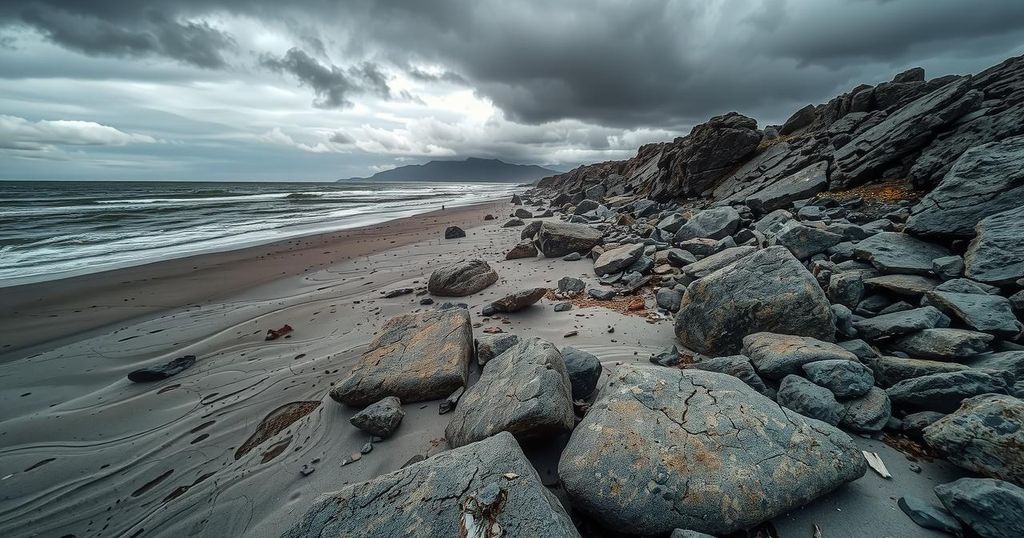Peruvian Fishers Seek Justice and Compensation Following Oil Spill Crisis
A significant oil spill from the New Talara Refinery in December 2024 has had severe impacts on artisanal fishers in northern Peru. The Peruvian government declared a 90-day environmental emergency, causing substantial economic disruption for over 4,000 fishers. Although fishers have returned to work, they claim that compensation from Petroperú is insufficient, leading them to seek additional support amidst ongoing environmental concerns and health risks from oil contamination.
On December 22, 2024, a catastrophic oil spill occurred at the New Talara Refinery in northern Peru, affecting a six-mile stretch of coastline. This environmental disaster prompted a 90-day emergency declaration by the Peruvian environment ministry, severely hindering tourism and disrupting the livelihoods of over 4,000 artisanal fishers. Three months later, these fishers claim that the compensation received from the state-owned Petroperú is inadequate, and they are actively seeking more support.
The leak was initially reported as a small-scale incident, with Petroperú reporting only 0.9 barrels of oil spillage. However, subsequent assessments revealed a much larger environmental impact and that cleanup operations did not remediate the area effectively. Fishers returned to work in an ocean still compromised by the oil industry and voiced concerns regarding the sufficiency of compensation from Petroperú.
Artisanal fisherman Tulio Chapilliquen emphasized the long-standing issues with oil spills in the region, stating, “When I was little and started fishing… I saw large quantities of oil spilled into that sea.” The situation remains dire as hydrocarbon contamination continues to affect marine life and the fishing community, leaving them struggling for survival and fairness.
In the wake of the disaster, the Peruvian Navy warned of an approaching tide that compounded the difficulties faced by the fishermen. Many boats were damaged, exacerbating the challenges presented by the oil spill. With the holiday season disrupted, some fishers even reported losing newly refurbished vessels within months of their inauguration due to the combined effects of oil pollution and severe weather.
As the environmental crisis continues, evidence of remaining hydrocarbons has been confirmed, and local health issues have arisen, with reported symptoms of pollution exposure among the fishing community. Critically, analysis from NGOs indicates that, similar to previous oil spills in Peru, the government and Petroperú’s response provided little support, leaving many fishers relying on community aid during this challenging period.
The fishermen demanded further compensation, arguing that Petroperú’s offer was inadequate given their financial losses. Responses from the state-owned company have suggested it fulfilled its commitments, but many local fishers feel that the compensation structure is imbalanced and unjust. Some fishers have resorted to legal action to pursue fairer compensation for their losses, illustrating the ongoing struggle between corporate entities and vulnerable communities.
Despite the challenges of navigating an oil-rich sea marked by contamination, fishermen in Talara have resumed their livelihoods with caution, continuously advocating for their rights and environmental accountability. As they confront repeated spill incidents, they remain united in their calls for justice and adequate remediation, all while confronting a backdrop of corporate financial mismanagement.
Petroperú, while claiming to provide clean energy for Peruvians, faces scrutiny for its environmental impacts and the response to the oil spill aftermath. The dissonance between corporate assurances and community realities accentuates the critical need for corporate accountability and effective environmental protection measures in Peru.
The December oil spill in Talara has had significant repercussions for the local fishing community and highlights the inadequacy of compensation offered by Petroperú. Despite a history of oil spills and environmental degradation, many fishers feel neglected and unprotected in the aftermath. Calls for increased compensation and improved veneration of environmental regulations underscore the ongoing struggle for justice and remediation as they navigate the challenges posed by both corporate entities and environmental disasters. Continued vigilance and advocacy by the fishing community are crucial in holding Petroperú accountable for its actions and ensuring the restoration of their livelihoods.
Original Source: news.mongabay.com




Post Comment